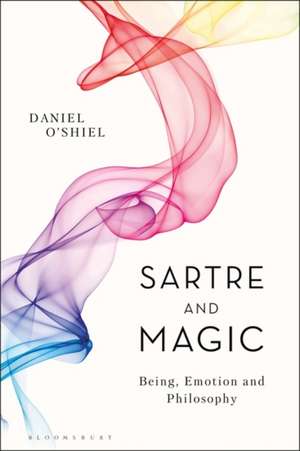Sartre and Magic: Being, Emotion and Philosophy
Autor Daniel O'Shielen Limba Engleză Paperback – 23 dec 2020
| Toate formatele și edițiile | Preț | Express |
|---|---|---|
| Paperback (1) | 216.70 lei 6-8 săpt. | |
| Bloomsbury Publishing – 23 dec 2020 | 216.70 lei 6-8 săpt. | |
| Hardback (1) | 655.67 lei 6-8 săpt. | |
| Bloomsbury Publishing – 26 iun 2019 | 655.67 lei 6-8 săpt. |
Preț: 216.70 lei
Preț vechi: 274.39 lei
-21% Nou
Puncte Express: 325
Preț estimativ în valută:
41.47€ • 42.78$ • 34.60£
41.47€ • 42.78$ • 34.60£
Carte tipărită la comandă
Livrare economică 26 martie-09 aprilie
Preluare comenzi: 021 569.72.76
Specificații
ISBN-13: 9781350230941
ISBN-10: 1350230944
Pagini: 208
Dimensiuni: 156 x 234 x 25 mm
Greutate: 0.3 kg
Editura: Bloomsbury Publishing
Colecția Bloomsbury Academic
Locul publicării:London, United Kingdom
ISBN-10: 1350230944
Pagini: 208
Dimensiuni: 156 x 234 x 25 mm
Greutate: 0.3 kg
Editura: Bloomsbury Publishing
Colecția Bloomsbury Academic
Locul publicării:London, United Kingdom
Caracteristici
Through an examination of a lesser known topic in an iconic philosopher this book initiates a much needed revision of twentieth-century thought
Notă biografică
Daniel O'Shiel is currently a postdoctoral researcher at the Instituto de Filosofía, Universidad Diego Portales, Santiago, Chile.
Cuprins
Acknowledgements Abbreviations Introduction: Magic, Sartre and his melting pot PART I. MAGIC IN SARTRE'S EARLY PHILOSOPHY (1936-1943) Chapter 1. Self- and Public Bewitchment: Sartre's Ego (1936) 1.1. The ego as object pole of reflective consciousness 1.2. States, actions and qualities of the ego 1.3. The ego's magic 1.4. Interpersonality and magic Chapter 2. Transforming Worlds: Sartre on Emotion (1938) 2.1. Transforming the world: emotive consciousness 2.2. The world transforming: Others and emotion 2.3. Centrifugal and centripetal: magic as the unifying element to Sartre's emotive consciousness Chapter 3. Evoking Absence: Sartre's Imaginary (1940) 3.1. Situating Sartre's imaginary: between perception and concept 3.2. Experiencing and evoking absence: perception, imagination and the analogon 3.3. The magic of the imaginary, and its complications Chapter 4. Magic Ontologized: Being and Nothingness (1943) 4.1. Sartre's ontological categories 4.1.1. Being-in-itself 4.1.2. Being-for-itself 4.1.3. Being-for-others 4.2. Sartre's trinity of ontological affectivity: nausea, anguish and shame 4.3. The impossible synthesis: facticity, value and magic 4.4. Possession and quality 4.5. Language and the magic of the other Interlude PART II. SARTREAN MAGIC IN OPERATION Chapter 5. Magic and the Arts 5.1. Play, artistic creation and magic 5.2. Sartre, literature and philosophy Chapter 6. Advertising 6.1. Advertising and its magic 6.2. Advertising, the market and rising technology Chapter 7. Racism and Other Figures of Magical Non-Thinking7.1 Not thinking, like a stone: Sartre on racism and stupidity 7.2. Magical non-thought, society and philosophy Chapter 8. Magic and Psychopathology 8.1. Hypercaptivation: dreams and psychopathology 8.2. The case of Schreber: a Sartrean reading Final remarks: Sartrean Magic, Philosophy and the Future Notes References Index
Recenzii
O'Shiel's careful analysis of magical experience in Sartre's early philosophy is a highly original and insightful contribution to Sartre scholarship that suggests potentially fruitful new lines of inquiry for phenomenology and existential philosophy more generally.
This clear and illuminating book makes a valuable contribution to an understudied concept in Sartre's early phenomenology-magic. Elucidating Sartre's claim that human nature cannot be grasped exclusively through causal explanations, O'Shiel shows the creative power, costly pitfalls, and contemporary pertinence of magical thinking, individually and socially.
This clear and illuminating book makes a valuable contribution to an understudied concept in Sartre's early phenomenology-magic. Elucidating Sartre's claim that human nature cannot be grasped exclusively through causal explanations, O'Shiel shows the creative power, costly pitfalls, and contemporary pertinence of magical thinking, individually and socially.
